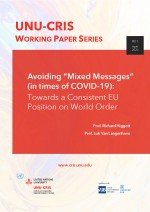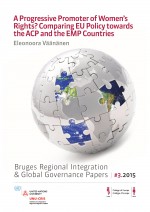The Arab Spring: A Litmus Test for the EU’s Women’s Rights Policy in the Euro-Mediterranean Area?
The promotion of women’s rights is described as a priority within the external action of the European Union (EU). As a result of the Arab Spring uprisings which have been ongoing since 2011, democracy and human rights have been pushed to the forefront of European policy towards the Euro-Mediterranean region. The EU could capitalise on these transformations to help positively reshape gender relations or it could fail to adapt. Thus, the Arab Spring can be seen to serve as a litmus test for the EU’s women’s rights policy. This paper examines how and to what extent the EU diffuses women’s rights in this region, by using Ian Manners’ ‘Normative Power Europe’ as the conceptual framework. It argues that while the EU tries to behave as a normative force for women’s empowerment by way of ‘informational diffusion’, ‘transference’ ‘procedural diffusion’ and ‘overt diffusion’; its efforts could, and should, be strengthened. There are reservations over the EU’s credibility, choice of engagement and its commitment in the face of security and ideological concerns. Moreover, it seems that the EU focuses more intently on women’s political rights than on their social and economic freedoms.



